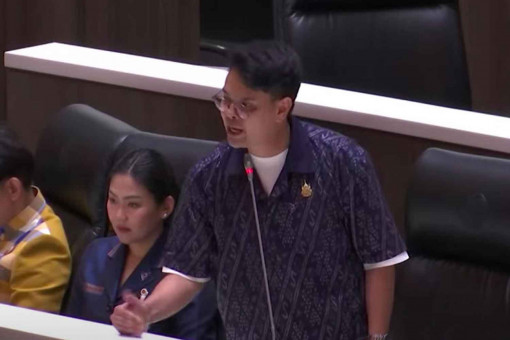
The relationship between the ruling Pheu Thai and its coalition partner Bhumjaithai has been bumpy since the government was formed, with their partnership seen more as a political necessity than a genuine alliance.
Recently, disunity between the parties seems to have escalated following Bhumjaithai secretary-general Chaichanok Chidchob’s declaration that he disagreed with the government-sponsored entertainment complex bill.
This has prompted Pheu Thai heavyweights to question the loyalty of their coalition partner.
From the start of the Pheu Thai-led government, the parties have clashed over several key issues, including Pheu Thai’s attempt to reclassify cannabis as a narcotic despite Bhumjaithai backing decriminalisation as a flagship policy.
There are also land disputes involving key figures of the parties that have intensified the split.
One case concerns the Shinawatra family’s ownership of the Alpine Golf Course, while the other involves land in Khao Kradong, Buri Ram, linked to Bhumjaithai’s de facto leader Newin Chidchob.
Although both cases are being reviewed by the authorities, key decisions rest with agencies closely aligned with the rival camps.
The fate of the Alpine Golf Course hinges on a ruling by the Ministry of Interior, which is largely influenced by the Bhumjaithai Party.
Meanwhile, the decision whether to revoke the title deed for the Khao Kradong land, which sits on property belonging to the State Railway of Thailand, now lies with the Pheu Thai-controlled Transport Ministry.
The latest point of contention between the parties is the entertainment complex bill.
Earlier this month, Mr Chaichanok, who is Mr Newin’s son, declared in parliament that he disagreed with the bill and would not take part in its consideration.
Although Bhumjaithai leader Anutin Charnvirakul assured that Mr Chaichanok’s stance is personal, Mr Chaichanok’s move cannot be ignored. Without support from the Bhumjaithai Party, the second largest party in the government, the bill is unlikely to clear the House.
While cracks in their relationship are increasingly visible, the Bangkok Post believes the time is not yet ripe for a split — whether by means of a House dissolution or the prime minister stepping down.
Both parties still need each other to deliver on their policy promises and build public support ahead of the next general election. Over the next two years, political bargaining will continue until voters return to the polls.
Stithorn Thananithichot, director of the Office of Innovation for Democracy at King Prajadhipok’s Institute, said the alliance between Pheu Thai and Bhumjaithai is delicately poised.
While tensions between the parties will persist, they are unlikely to escalate to the point where a split is inevitable.
In his view, Pheu Thai appears politically weakened, especially when compared to Bhumjaithai, which has grown stronger and is seen as better prepared for a future election.
However, the authority to dissolve the House lies solely with Prime Minister Paetongtarn Shinawatra, leader of the Pheu Thai Party.
Under current circumstances, a House dissolution could backfire on Pheu Thai due to its waning popularity, he said, adding the party could suffer significant losses in a snap election.
Bhumjaithai is not guaranteed to benefit from an early House dissolution, either. “The votes lost by Pheu Thai will not necessarily flow to Bhumjaithai.
It’s possible that a large portion of votes could go to the People’s Party (PP) instead, which could further complicate the political landscape,” he said.
If the PP is to capture over 200 seats and Bhumjaithai emerges the first runner-up with about 120 seats, the legitimacy of Bhumjaithai forming a government, when it is not the largest party, will be called into question.
Mr Stithorn said that such a scenario, where the election winner is excluded and pushed to the opposition, could spark a public backlash. Bhumjaithai also appears to be aware of this problem, according to the analyst.
The ideal situation for the coalition party is one where Pheu Thai is not too weak or too strong, he said.
If Pheu Thai becomes too weak, the PP stands to gain the most. But if the ruling party grows too strong, it could be at the Bhumjaithai’s expense, as it means political families on which these parties rely would defect to the Pheu Thai Party.
He said Pheu Thai is now focused on delivering its policy promises to regain public confidence and a key project is the proposed casino-entertainment complex.
If the scheme moves forward, Bhumjaithai sees it as a win solely for Pheu Thai, he said, adding Bhumjaithai remains wary of any policy that could give the ruling party a political advantage.
On a cabinet reshuffle, Mr Stithorn said it could be used as a political bargaining tool to ease tension with Bhumjaithai, which is expected to insist on retaining its existing cabinet quota.
A large-scale reshuffle that reallocates key ministries to Pheu Thai would lead to a political split, he said.
“For now, both parties are likely to continue negotiating within the current power-sharing arrangement. There will be some pushback…but not pushing too hard,” he said.
He said the situation will persist until Pheu Thai can match the popularity of the PP while Bhumjaithai works on pushing key policies to strengthen voter support.
Should the political situation reach this point where both parties feel confident about going to the polls, a House dissolution could be on the cards.
“It’s likely toward the end of the government’s term, once all parties have secured what they want,” he said.

Paetongtarn: Wants a big win

Anutin: Vying for influence

